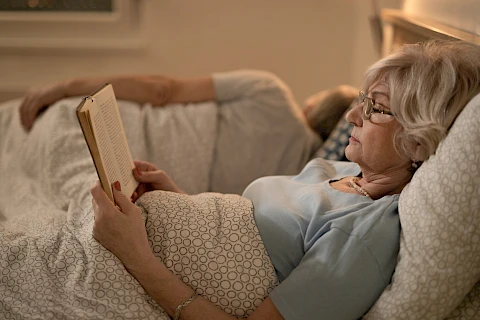
As the days grow shorter and the long nights set in, seniors may find their sleep habits affected. This daylight shift can disrupt the sleep patterns of older adults, and addressing these changes is valuable for maintaining overall health and well-being.
For loved ones, a good night's sleep is a cornerstone of physical health, emotional balance, and cognitive function. Fortunately, several solutions can make it easier to navigate changing rest needs.
Sleep Challenges in Seniors
Seniors are more likely to experience various sleep issues, including difficulty falling or staying asleep, or waking up too early. Shorter days can exacerbate these problems. The decrease in daylight can affect their circadian rhythm, the internal clock that regulates the sleep-wake cycle.
This can lead to difficulties in falling asleep at the desired time and may compromise the quality of rest, leaving them feeling groggy and unrested. By understanding these challenges, caregivers can better support their lives.
The Importance of Consistent Sleep Schedules
Maintaining a consistent sleep schedule is essential for seniors. Going to bed and waking up at the same time every day helps regulate the body's internal clock, promoting better rest quality. Consistency helps the body know when to wind down and when to wake up, reducing sleep disturbances.
A regular schedule contributes not only to improved but also to enhanced mood and cognitive function. Maintaining consistent senior sleep routines often feel more energetic and alert throughout the day.
Creating a Sleep-Friendly Environment
A comfortable and inviting bedroom can make a significant difference in sleep quality for seniors. To create a sleep-friendly environment, consider the following tips:
- Keep the bedroom dark and quiet. Use heavy curtains or a sleep mask to block out light and earplugs or white noise machines to minimize noise.
- Ensure a comfortable mattress and pillows. These should support the sleep preferences, whether they prefer firm or soft surfaces.
- Maintain a cool room temperature. A slightly cooler room can promote better rest, as it mimics the body's natural drop in temperature at night.
These simple changes to the bedroom can make the environment much more comfortable and increase sleep quality.
Establishing Effective Bedtime Routines
Establishing a calming bedtime routine can signal to the body that it's time to wind down. Some effective pre-sleep activities can help you unwind before bed. Reading a book or listening to soothing music can relax the mind. Light stretching or yoga can ease physical tension. It’s also best to avoid screens and bright lights at least an hour before bedtime, as they can interfere with melatonin production, the hormone that helps you rest.
Additionally, diet and exercise play roles in promoting restful sleep. Encourage loved ones to participate in regular physical activity during the day and limit caffeine and heavy meals close to bedtime.
Special Considerations for Caregivers
Caregivers play a major role in helping adjust senior sleep routines. It's necessary to be patient and understanding, offering reassurance and support as they adapt to new schedules.
Care providers should monitor any changes in behavior or mood that could indicate sleep problems and consult with a healthcare professional if needed. Fostering open communication with older adults about their sleep preferences and challenges is essential. Encourage them to express their needs and concerns.
Provide More Care for Seniors During the Fall and Winter
As the days shorten, it's essential to address the senior sleep routines and challenges that affect their health and well-being. Implementing consistent schedules, creating an optimal slumber environment, and establishing effective bedtime routines can significantly improve rest quality. For caregivers, offering understanding and support is key to helping loved ones adapt to these changes.
Often, the fall and winter months may make it apparent that your loved one needs more support at home. If you're seeking personalized support with senior care in Madison, Stoughton, Oregon, Monona, or Sun Prairie, contact Senior Helpers Madison, WI. With our dedicated team ready to assist, older adults can enjoy a restful night's rest and maintain a higher quality of life.